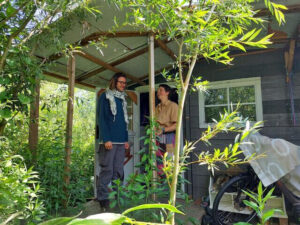 13 June 2024, Wageningen – Since Tuesday 11 June, Veerweg 121 has been inhabited by the community and eco-squat ‘De Achtertuin’ (The Backyard). The Wageningen group, together with dozens of activists, has squatted this new terrain to argue for a sustainable and socially just living model. This action is a direct response to the ongoing housing crisis, environmental crisis and growing social inequality in the Netherlands.
13 June 2024, Wageningen – Since Tuesday 11 June, Veerweg 121 has been inhabited by the community and eco-squat ‘De Achtertuin’ (The Backyard). The Wageningen group, together with dozens of activists, has squatted this new terrain to argue for a sustainable and socially just living model. This action is a direct response to the ongoing housing crisis, environmental crisis and growing social inequality in the Netherlands.
Squatting is legit
The squatted lot has been vacant for at least 17 years and is currently owned by a property developer. In the latest plans, which have not been approved, a construction project of expensive owner-occupied homes was proposed. To this day, there are still no concrete and accepted plans for the site. The activists therefore consider it justified to establish their right of residence on this vacant lot. [Read More]


